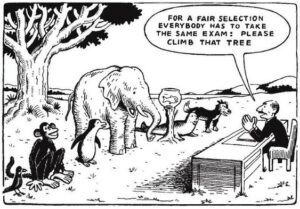Week 1: Thoughts on “There are many ways to get it right online. Best practice neglects context”.

Image 1: This image was taken from Russell, M. (2012, July 12). The Education System: “Now Climb that Tree”. The Marquette Educator. https://marquetteeducator.wordpress.com/2012/07/12/climbthattree
In summary, to me, this point of the manifesto highlights the need for teachers to be flexible in their pedagogical approach and selection of tools, and to continually think and re-think our teaching methods to be more student-centric. Reading this point of the manifesto brought to mind the above picture (image 1) that was circulated heavily across the internet a few years ago. Many of my colleagues and peers were championing this image on social media, echoing the original author’s call for a reformation of education systems by utilizing a wider range of assessments of intelligence and abilities that do not disadvantage any particular one. I admired this idealism, but unfortunately I was and still am sceptical of it for a few reasons.
Having taught in both at primary and secondary levels, I understand the institutional need for standardisation in teaching. Few educators would argue against the need to be flexible. Nonetheless, it is important for us to remember that one key objective of education is to equip students with necessary skills that will make them employable. Unlike the animals in the picture, our students still need to learn certain skills that are required regardless of the job. A fish will never need (or be able) to climb a tree, but it is highly likely that a swimming coach needs to submit his lessons plans in a standardised format that is typed out using Microsoft Word. Therefore, there are some tasks that need to be taught and learnt regardless of how mundane students and teachers perceive them to be.
Currently, I teach both full-time and part-time undergraduate students and I have noticed that both groups have different goals. My full-timers tend to be more receptive towards pedagogical experimentation on my part. I believe that this is because they are immersed in the idea of “university life”. Even the least motivated student will participate in the Space Race activity (available on socrative.com) where students tap their responses on their phones and watch in excitement as their team’s rocket makes another burst with every right answer. In contrast, my part-timers tend to be more pragmatic in their views of their educational goals. To them, the space race activity is seen as another chore of having to log onto another website that delays them from receiving the information they want. Perhaps, their idea of fun is an evening spent with their families over dinner instead of having to rush to a class after work.
We need to also accept that “The Man” stands to benefit from change and they know this. It is easy (and possibly second-nature) for anyone to point a finger at the education system, pick out a laundry list of problems and blame those in-charge for these deficiencies. However, change takes time because research, review and implementation take time. Moreover, most significant changes in any education system is a result of evolution not a revolution. Singapore was notoriously famous of placing emphasis on “rote learning, memorisation and drilling”. However, here is a video (see video 1 below) of then Education Minister of Singapore, Ong Ye Kung conducting a forum with parents, explaining to them the educational reforms that are being made.
Video 1: CNA. (2019). Talking Point E19: Singapore education reforms – What do parents, students feel about it. Youtube. https://www.youtube.com/watch?v=L2xBg7Qz-M4
Personally, I hope to be able to strike that balance between diversity and standardisation. Earlier in my career when I was merely a teacher, I would have readily accepted this point of the manifesto as gospel. However, now that I have multiple roles and identities, such as teacher, curriculum designer, civil servant and student, I am better able to see the difficulties in simply abandoning “best practices”.




Your posts are consistently high standard. This course seeks to challenge some assumptions for example:
“Nonetheless, it is important for us to remember that one key objective of education is to equip students with necessary skills that will make them employable.”
Have a read of this
https://journals.sagepub.com/doi/abs/10.2304/pfie.2013.11.6.733
And think about other, less salient, purposes for education. What is lost when we reduce education to a supply system for business and industry?